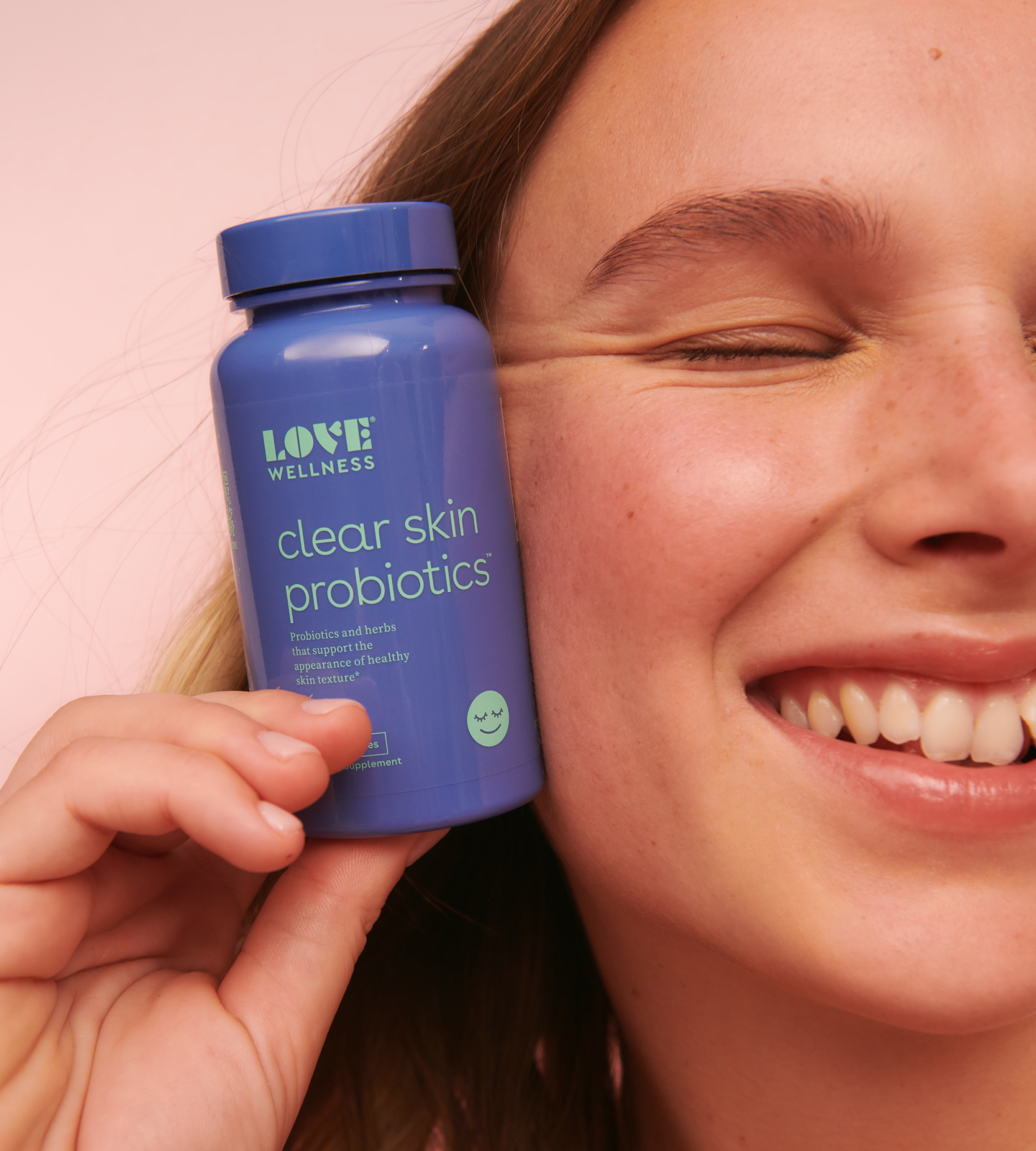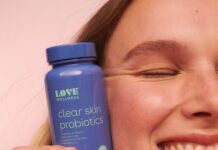Skincare is an essential part of our daily routine, as it helps us maintain a youthful appearance and plays a crucial role in our overall health. Our skin is the largest organ in our body and is a protective barrier against external factors such as pollution, UV radiation, and bacteria. Therefore, taking care of our skin is important to prevent various skin problems and maintain its health.

One aspect of skincare often overlooked is the connection between gut and skin health. The gut-skin axis refers to the relationship between the gut microbiome and the skin. The gut microbiome is a complex ecosystem of bacteria that resides in our digestive system and plays a vital role in our overall health. Recent research has shown that imbalances in gut bacteria can lead to various skin problems, such as acne, eczema, and rosacea. Therefore, taking care of our gut health can significantly impact our skin’s health and appearance.
Understanding the role of gut health in skin health
The gut-skin axis is a bidirectional relationship between the gut microbiome and the skin. The gut microbiome consists of trillions of bacteria that help break down food, produce essential nutrients, and regulate our immune system. These bacteria also play a crucial role in maintaining the integrity of our skin by influencing various physiological processes such as inflammation, immune response, and barrier function.
Athe gut microbiome is imbalanced, known as dysbiosis, which can lead to inflammation and immune dysfunction. This can manifest as various skin problems, such as acne, eczema, psoriasis, and rosacea. Studies have shown that individuals with these skin conditions often have an altered gut microbiome compared to healthy skin.
What are probiotics, and how do they work?
Probiotics are live microorganisms that provide health benefits when consumed in adequate amounts. They are often referred to as “good bacteria” as they help restore the balance of the gut microbiome. Probiotics can be found in various foods such as yogurt, kefir, sauerkraut, and kimchi, as well as in supplement form.
When consumed, probiotics help improve gut health by increasing the number of beneficial bacteria in the gut. They also produce substances that inhibit the growth of harmful bacteria and promote a healthy immune response. By restoring the balance of the gut microbiome, probiotics can help reduce inflammation, improve digestion, and enhance nutrient absorption.
The benefits of probiotics for clear skin
Probiotics have been shown to have numerous benefits for skin health. One of the key benefits is their ability to reduce inflammation. Inflammation is a common underlying factor in many skin conditions, and by reducing inflammation, probiotics can help alleviate symptoms and improve overall skin health.
Probiotics also improve skin hydration and barrier function. Studies have shown that certain strains of probiotics can enhance the production of ceramides, which are essential for maintaining the skin’s moisture barrier. This can help prevent dryness, flakiness, and other signs of dehydration.
Furthermore, probiotics have been found to have antimicrobial properties, which can help combat acne-causing bacteria. By inhibiting the growth of harmful bacteria on the skin, probiotics can help prevent breakouts and promote clearer skin.
Different types of probiotics and their effects on skin
There are many different strains of probiotics, each with its unique benefits for skin health. Some of the most commonly studied strains include Lactobacillus acidophilus, Bifidobacterium bifidum, and Lactobacillus rhamnosus.
Lactobacillus acidophilus has been shown to have anti-inflammatory properties and can help reduce redness and irritation in the skin. It has also improved the skin’s barrier function and hydration.
Bifidobacterium bifidum is another strain that has been shown to have anti-inflammatory effects. It can help reduce the severity of acne and improve overall skin health.
Lactobacillus rhamnosus is known for its antimicrobial properties and can help inhibit the growth of acne-causing bacteria. It has also been found to have antioxidant effects, which can help protect the skin from damage caused by free radicals.
Best food sources of probiotics for clear skin
Incorporating probiotic-rich foods into your diet is a great way to support gut health and promote clear skin. Some of the best food sources of probiotics include yogurt, kefir, sauerkraut, kimchi, and kombucha.
Yogurt is one of the most well-known sources of probiotics. Look for yogurt that contains live and active cultures, as these are the beneficial bacteria that provide health benefits. A Greek yogurt is a good option as it contains higher amounts of protein and less sugar than regular yogurt.
Kefir is a fermented milk drink that is rich in probiotics. It has a tangy taste and can be enjoyed independently or added to smoothies or cereal.
Sauerkraut is a traditional fermented cabbage dish that is packed with probiotics. It can be eaten independently or used as a topping for sandwiches or salads.
Kimchi is a Korean fermented vegetable dish known for its spicy and tangy flavor. It is made with cabbage, radishes, and other vegetables and is a great source of probiotics.
Kombucha is a fermented tea drink that is becoming increasingly popular. It is made by fermenting sweetened tea with a culture of bacteria and yeast. Kombucha comes in various flavors and can be enjoyed as a refreshing beverage.
Probiotic supplements for skin health: What to look for
If you prefer to take probiotics in supplement form, there are a few things to consider when choosing a probiotic supplement for skin health. Look for a supplement that contains a variety of strains, as different strains have different benefits for the skin. It is also important to choose a supplement containing many live bacteria, as this will ensure you get an adequate dose.
The viability of the bacteria is also important, as some strains are more sensitive to heat and moisture. Look for supplements that are packaged to protect the bacteria from these factors.
Lastly, it is important to choose a reputable brand that has been tested for quality and efficacy. Look for supplements that have been third-party tested and have good customer reviews.
How to incorporate probiotics into your skincare routine
In addition to consuming probiotics internally, they can be used topically in skincare products. Probiotic skincare products contain live bacteria or their byproducts, which can help restore the balance of the skin microbiome and improve overall skin health.
Probiotic skincare products come in various forms, such as cleansers, serums, moisturizers, and masks. When choosing a probiotic skincare product, look for one that contains live bacteria or their byproducts, such as lysates or extracts. These ingredients can help promote a healthy skin microbiome and improve the appearance of the skin.
Clean your face with a probiotic cleanser to incorporate probiotics into your skincare routine. This will help remove dirt, oil, and makeup while introducing beneficial bacteria to the skin. Follow up with a probiotic serum or moisturizer to further nourish and protect the skin.
Probiotics vs. traditional acne treatments: Which is better?
When it comes to treating acne, various options are available, including probiotics and traditional treatments. Traditional treatments often include topical creams or gels containing ingredients such as benzoyl peroxide, salicylic acid, or retinoids. These treatments reduce inflammation, unclog pores, and kill acne-causing bacteria.
On the other hand, probiotics restore the balance of the gut microbiome and, subsequently, the skin microbiome. They can help reduce inflammation, inhibit the growth of harmful bacteria, and improve the skin’s barrier function.
Both probiotics and traditional acne treatments are effective in treating acne. However, probiotics offer a more holistic approach by addressing the underlying cause of acne rather than just treating the symptoms. They also have fewer side effects cthantraditional acne treatments, which can cause dryness, redness, and irritation.
Prebiotics and their role in supporting probiotics for clear skin
Prebiotics are non-digestible fibers that serve as food for probiotics. They help nourish the beneficial bacteria in the gut and support their growth and activity. By consuming prebiotics, you can help create an environment in the gut conducive to the growth of beneficial bacteria.
Some common food sources of prebiotics include garlic, onions, leeks, asparagus, bananas, and oats. These foods contain high amounts of prebiotic fibers such as inulin and fructooligosaccharides.
Incorporating prebiotic-rich foods into your diet and probiotic-rich foods or supplements can help support the growth of beneficial bacteria in the gut and promote optimal gut and skin health.
The future of probiotics in skincare: What to expect
Probiotics in skincare is a relatively new concept, but it is gaining popularity due to its numerous benefits for skin health. As research continues to uncover the connection between gut health and skin health, we expect to see more advancements in probiotic skincare.
One area of research that shows promise is the use of personalized probiotics. Personalized probiotics are tailored to an individual’s gut microbiome and can help address their unique skin concerns. This approach tconsidersthe diversity and composition of an individual’s gut bacteria and provides a targeted solution for improving skin health.
Another area of research is the development of probiotic skincare products that contain live bacteria. These products are designed to deliver live bacteria directly to the skin, where they can colonize and provide ongoing benefits. This approach holds great potential for treating various skin conditions and maintaining optimal skin health.
Taking care of our gut health is essential for maintaining clear and healthy skin. The gut-skin axis plays a crucial role in our overall health, and imbalances in gut bacteria can lead to various skin problems. Probiotics offer a natural and effective way to improve gut and skin health.
Incorporating probiotics into our diet through foods or supplements can help restore the balance of the gut microbiome and promote clear skin. Probiotic skincare products can also be used topically to nourish and protect the skin.
As research continues to uncover the connection between gut health and skin health, we expect to see more advancements in probiotic skincare. The future of probiotics in skincare holds great promise for improving the health and appearance of our skin.





